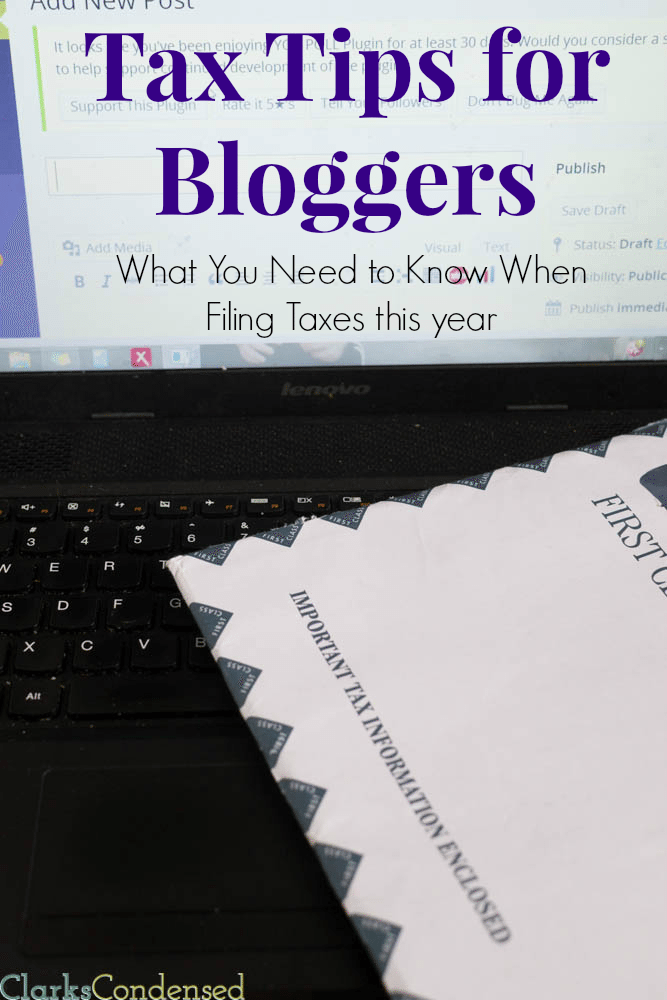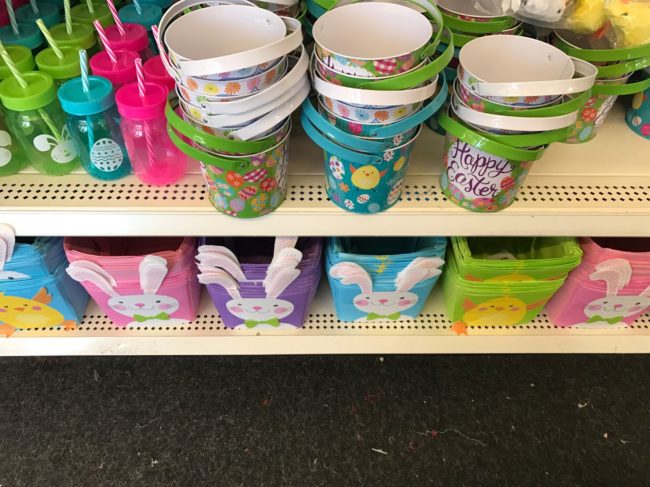Tax Tips for Bloggers

Disclaimer: This information is provided on an information basis only. Katie is not a tax expert, and even though Bruce Barker is, this is general advice about blogging and taxes. Do not consider this as a consultation on your individual needs. Pleas consult a tax professional to discuss your individual situation.)
Tax Tracking Form at bottom of page
It’s that time of year that most people dread — tax season. If you are self-employed, it can be a tricky process…and if you’re a blogger? Even more so! I’m a part of many blogger support groups on Facebook, and one of the most frequently asked question is about taxes. After observing these conversations, I discovered that they are many misconceptions about taxes and blogging — what you have to report, when you have to report, and more.
Lucky for me, I happen to have an experienced tax preparer in my family — my dad. He has over 30 years experience in the tax field, and he knows quite a bit. When I was home over the holidays, we discussed some of the topics related to taxes and blogging, and my dad offered to write a post about tax tips for bloggers. I hope that this post will help you better prepare your taxes this year. While my dad is very qualified as an enrolled agent, please consult your own accountant or tax adviser while doing your taxes.
What are some basic things beginning bloggers should know ?
Each taxpayer’s situation is different and there could be different answers based on each individual’s special circumstance.
What are the advantages of, and when should you become, an LLC, Inc, or sole proprietorship?
An LLC (Limited Liability Company) is not an IRS entity. Each state has their own rules regarding LLCs and you should review your particular state’s rules. They were initially formed to provide some liability protection to business owners. If you are seeking liability protection, you should consult with an attorney. You can form an LLC that is reported as a proprietorship on your federal income tax return. An LLC can also be filed as a partnership or corporation. The advantages to the various entities is an extensive explanation. The IRS does not require all businesses to be an LLC. You can be a proprietorship and simply use your name to report the income and expenses. If you want to have a business name you may need to register that with your state. It is a good idea to use a different name for your business than your name because you may want to protect your personal name and social security number for your customers and vendors. If you are setting up a business checking account or will be receiving money from a lot of customers, you may want to get a Federal ID number.
Should you have a separate bank account set up for business expenses/income?
This is not required. You can keep track of your income and expenses inside of your personal checking or savings accounts. It is a practice to have a separate bank account and credit card that you use for business. This will allow you to keep your income and expenses separate from your personal funds. Trying to sort out your expense from your personal checking account can be very confusing.
Receipts and invoices from your purchases should be kept, documented and filed by expense category. You should also be able to support those expenditures through your bank statements and credit card statements. If you are audited by the IRS, they may not accept only a receipt, they want to make sure you aren’t just borrowing someone else’s receipts.
What are the rules for reporting/writing off products that were received for review?
I’m still trying to get a good handle on this. Each item would have to be considered separately. Receiving a $20,000 car versus a $20 white board is completely different. In most cases you are just receiving a sample of something to try and are writing about it and there is no further continued use of the item. If you had to purchase the item to sample it, you would most likely be able to claim it as a business expense. If you receive a gift card or cash, you may want to claim that as income, but then you could also deduct the item as a business expense if you are using the cash to purchase a product that you are writing about. If you do this, you will want to keep your receipts to prove that is what you spent the designated money for. If you give the gift card away, then you may not be able to use that as a deduction, unless it was considered advertising for your business.
In general, if you are sent a product for the purpose of you reviewing it, you should report it on your taxes. This post has some good advice about free products you get.
When do you need to report income?
Many people believe that if they make under $600 from one person or business, for services performed, that it does not have to be included as income on their tax return. If the companies issuing the 1099s are telling your friends that they don’t have to claim income under $600, they are absolutely incorrect (source). These companies will not backup their claims in tax court. They should not be giving tax advice.
Generally all income is reportable unless specifically stated as tax exempt. Many people have the misconception that if they get paid under $600 they do not have to claim it as income. This $600 threshold is referring to those that are required to issue a 1099MISC for goods or services, not those receiving the money. For example, I do over 450 tax returns and received very few 1099s. So if I average $300 a tax return I would make $135,000, then according to your friends I don’t have to claim $135,000 as income. What great concept! I wish it was true!
The other issue of taxes under $400 not being taxable is another misconception. This refers to the self-employment taxes. If your income after expenses is under $400 then you don’t have to pay self-employment taxes on that income. Self-employment taxes are the same as Social Security and Medicare taxes, some people call them FICA. Although you don’t have to pay self-employment taxes on this level of income, you still need to pay federal and state INCOME TAXES.
Of course I believe you should use an accountant to prepare a tax return, especially when you have a rental property, business, investments and other complicated issues. Your tax preparer generally does many returns and takes classes every year to stay up on the law. The IRS code is very complicated and it is to your advantage to consult a professional.
Is food deductible as a business expense, and if so, what are the criteria for that deduction?
You can deduct the cost of meals and entertainment that have a business purpose. You need to document this by keeping receipts and writing on the receipt who you had the meal with and the business purpose. These types of expenses are only 50% deductible. You can also deduct meals if you travel over-night on a business trip. If you have a business meeting and you provide a meal or refreshments, you can deduct these expenses 100%. If you are sampling recipes and writing about them, you can also deduct the cost of those meals As with all business expenses, you have to have a profit motive for your business. If you are not generating any income, I wouldn’t suggest deducting these expenses.
Some businesses need time to grow before their income exceeds their expense. It is okay to have a negative income on your tax return, but the IRS may consider it a hobby instead of a business and there are different rules for hobbies. You generally have to show a profit in three out of five years. It is not healthy financially to go very many years without showing a profit. In all cases you need to treat your business like a business. That is, to keep books for your business, advertise, have profit motivated expenses, invoice customers, pay sales taxes, etc.
When you are not showing a profit and do not have any hopes of a profit. You still need to claim the income, but you have to deduct these expenses on Schedule A (Itemized Deductions).
Can I deduct supplies for projects I blog about?
Yes. But you should consider the amount of personal use involved and the magnitude of the supplies.
Yes, if the post brings you other revenues based on hits to your website. There must be a business purpose.
I answered office in home questions above. You can deduct internet and phone usage, but you can only deduct the percentage that applies to the business use. You will need to have a way to prove your percentage to the IRS.
If these products are being used as a subject in a blog post (such as for a review), you can deduct them. Otherwise they would be taxable and have to be reported. If you receive a product for free (such as in a giveaway) that values over $600, the person or company who supplies it must send you at 1099. On a similar subject, if you giveaway a product worth more than $600, you must send the winner a 1099, so it’s in your best interest to make sure products in giveaways don’t value over $600.
Some companies pay in gift cards — do you have to report this?
Yes, that is considered taxable income.
What is the benefit, if any, to using a TIN and/or submitting a DBA to your town/city?
A tax ID number is valuable when setting up a business account in a name other than your personal name. Also, if you have employees you will need this ID number to report the payroll taxes. It is also better to avoid using your name and social security number in your business. There are a lot of issues of fraud and identity theft.
I would suggest you get an EIN and not use your SSN on your business, because of identity theft issues.
Can purchases such as laptops, cameras, tablets, etc. be written off?
Yes, but you may have to depreciate the item over more than one year and only deduct the business portion of these items.
If we agree to take a product to try, but we’re not agreeing to review it (so, essentially a PR gift) do we claim those?
Depends. You don’t always have to give a good review. If you review an item and don’t like it, I would claim it as a deduction. You are in the business of sampling things and writing about them. Again, the magnitude of the item may be an issue. Like, if you receive a $1000 gift card to Macy’s, I don’t think I’d write off the full amount.
Here is a great list of legitimate tax deductions for bloggers, and this site lists even more!
If you have any other questions, feel free to leave them in the comment section!
If you need a way to track your taxes this year, here is the form I use to track everything and anything for taxes. If you want to use it, click file, and then make a copy, to save it to your own files!
![]()







I liked that you talked about if you want to deduct for supplies you need to factor in if they are used for personal uses as well. It seems like it would be hard to figure that out. It does seem like it would be best to get a professional to help with getting ready for taxes.
This post is very informative especially for a newbie. If you do blogging part time and have other job, dhould you claim it on schedule c?
Katie, What an excellent article! I found your information to be accurate and helpful. Thank you for explaining the myth about not having to file taxes if your income was less than $400. Just a few minutes ago, I was on another site which told readers they didn’t need to file if their net income was less than $400. I knew this couldn’t be right. I was so happy to read your article which offered a logical explanation.
Thank you for commenting! I’m so glad you found it helpful. That whole $400 thing is a common myth, and it’s one that my drives my dad bonkers (and me too – some people are very adamant that you don’t have to report it!)
Hi Guys I am doing my taxes for the first time this year! I love this post, it is so informative. I decided to make a Pinterest Board and a round up on my blog and I included this post! I hope that is ok! If not let me know and I will remove it!
Kim
That’s totally fine with me! Thank you for asking! 🙂
Nice article. One exception I comment / addition to your mention of the depreciation requirement of capital equipment: You can take a section 179 and deduct the entire amount in a single year. Many people are confused by the topic of depreciation. Bottom line: If you have income you can, and probably should, depreciate the entire thing in a single year against that income. Better yet – as a sole proprietor (you know, the schedule C types) you can deduct it from your “day job” income as well – not just income from the business – unless you are treating your business entity as an C or S-corp instead of a disregarded entity.
Great tips! THanks for chiming in!
Great post and so helpful. New blogger here and we finally started making money. Here’s the problem. We started in March 2014 and started making money in October. We never thought we’d actually be making a decent amount. It’s my best friend and I. We plan on splitting the profit 50/50 but right now all of the funds are going into her paypal account under her name solely. What’s the best way to file for this year? Also want to start the new year doing things the right way, so which way would that be, being that there are two of us 50/50 partners? Our expenses thus far are not equal either. HELP!
I’m so sorry I am just now responding! I’m assuming you probably figure this out, but I don’t have a good answer for you. If you still haven’t, please let me know and I can ask my dad. If you did find out, I’d love for you to comment back for people who may be having the same issue.
Thanks so much for this information and for the tax prep form. This looks like a huge help!
You are so very welcome!
Hi Katie, thanks for this post. I am gonna keep these tips handy and gonna land into less trouble about taxes from now on. This year however I did took help from tax professionals that go by the name of Pun & McGeady LLP and they were great, from next time I am gonna manage my taxes by myself.
Hi,
I’m a blogger and a professional tax preparer and I really like the way you dispelled a lot of the myths about small business taxes.
Allow me add one opinion about LLCs and Corporations as compared to sole proprietorships…
Another good reason to organize your business as an LLC or a corporation is because in some cases you can elect s-corp taxation. If your blog becomes successful, you might end up paying less self employment tax that way – but of course consult with a tax professional first.
Thanks again,
Tod
Hi Tod! Thanks for your input. I completely agree with you — in fact, I recently began an LLC just in case this were to be a good option for me someday. Thanks for stopping by 🙂
Katie, OMG this post saved my day/week/year! I have been searching for all these answers to my questions and to have them all in one spot is so helpful, THANK YOU! I am bookmarking this and referencing often. Just filed my taxes this week and have done my own taxes for the past 10 years but for the first time I considered getting help. Now I feel more empowered and educated to keep doing them myself and saving money. It’s definitely one of the downsides of having your own business is doing bookkeeping and paying a big fat check to the IRS but that comes with the territory and the pros of being a small business owner far outweigh the cons! Thanks for sharing the template too! I blog for a website that has tips for small business to stay safe and secure online https://www.asecurelife.com/security-tips-for-small-businesses/ for any fellow freelancers out there. Thanks again and keep up the great work!
So sorry it’s taken me so long to respond! I”m so glad that you found this helpful. My dad really wanted to help me get some good information out there for bloggers, but, really, there’s a lot of inaccurate information and myths. And I agree — it’s so hard to do all the bookkeeping, but in the end, I think it is definitely worth it. Thanks for weighing in!
Oh, wow! That’s a great list of questions/answers! Taxes can be SO complicated! I’ve worked in accounting for years, so I’ve got the basics down, but there are parts that are still confusing to even me! Blogging is definitely it’s own beast.
It really is! I’m thinking the IRS just needs to come out and do a whole big seminar on what they expect from bloggers. It’s so confusing! Sometimes I say I want to quit blogging solely because of this 😉
Thanks for the info! I am going to have to get an accountant this year for sure. Before I became a blogger I always did my own taxes since our situation was so simple. Now, I am beyond confused. This is the best article I have found so far. I am still confused about how much we can deduct for items we purchase that we blog about, but are for personal use. For example, I blogged about redoing our kitchen countertops. I am not sure what portion of the supplies needed to do this DIY project I can deduct (if any) since I use the kitchen counters for personal use and I would have done them regardless of whether I blog or not. It is such a hazy gray area!
I know, that’s the hard part — knowing what you count, and what you can count off. I really hope someone will come out with a hard and fast rule soon (ahem…IRS, are you listening?!)
Thanks for sharing. I had a local blogger ask me about this yesterday. I will forward her this blog. Thank your Dad too.
No problem, I’m glad it could help!
Lots of good information here and things to think about – thank you!
YOu are so very welcome! I’m glad it was helpful to you 🙂
Thanks to you and your Dad Katie. This is so helpful and timely!
You are so very welcome! I’m glad it was helpful 🙂
As the leading expert in social media and tax law I will say this: any time you receive a product / service / trip / something in exchange for a post, a review, tweeting & facebooking or any other means of promoting that brand you have received income and thus must report it to the IRS or CRA. Many brands will mark full size product as samples to get around having to send you a 1099, but you still must report this income. More info can be found here : https://shoeboxbegone.com/helpmyblog/ Also, if you can prove business activities such as advertising your blog, networking, actively pursuing gigs than you can claim related expenses against the income. Hope this helps! Anyone who has questions is welcome to email me 🙂
Wow thank you so much for posting this Angele! This is super, super helpful, in an area that everyone seems to be confused 🙂 I appreciate you chiming in!
My pleasure! I can be reached at help at shoeboxbegone.com if anyone needs assistance 🙂
Katie,
Thanks so much to you and your dad for this comprehensive list! This is the first year I need to think about this subject, and I’ll point my tax preparer, my MIL, in this direction. I know that I need to declare income, but I wasn’t sure what to do about blogging specific expenses (the photo lights, the reflectors, the plates/placemats that I use solely for blogging). Food, that I purchase and blog about and then feed my family (no sponsorship at all) seems like something I could not write off. I mean, we’re eating it, you know?
I”ve been waiting for this, tell your Dad thanks!
Thank you Katie and thanks to your dad! I needed this! I just have to clarify, if for example I get a mixer to review (no money) then I should count that as income? I’m reading that correctly?
Katie,
Super comprehensive read! Be informed. Save money. Bloggers have more than a few write off’s to seize if they educate themselves on the tax topic.
Thanks Katie!
Wow, this is absolutely fantastic. Thanks you! Send your dad over, I want to make him some cookies.
Thanks to you and your dad for such an informative post!i never knew that I should save bank statements. Soooo I better start getting those! I just save my receipts month by month.
You are very welcome! And seriously, I feel like I need a separate room for all the information you are supposed to keep!
Great post, thanks for the tips! What I was told about product reviews, product samples, gift cards, etc. is that all of that counts as bartering. As in, you were paid a vacuum cleaner instead of $100 cash to review said vacuum cleaner, so basically you were paid in barter trade. So basically any products you receive need to be counted as income, regardless of whether you win them in a giveaway, are sent a small sample, or are sent something bigger like a vacuum (even if it’s only for purposes of the review).
And as far as deductions go, you can deduct the cost of anything that you need in order to blog. It’s kinda vague, but basically if you have to buy the product in order to review it you can definitely count that as a business expense. If you are given a $50 gift card in order to purchase a $50 product, the gift card counts as income, and you can deduct the $50 cost of the item. If you are just given the product for free, it is counted both as income and you can deduct it as an expense, because, if you weren’t given the product you would have had to go buy it in order to write the review. So basically free products should cancel themselves out because, yes, you need to count them as income, but if they were sent to you for the purpose of a review, you can also count them as a necessary business expense.
I’m not an accountant, but this is what my accountant tells me. Hopefully she’s not wrong!
Hi Jessi!
Thanks for all your insight! The whole product review thing is a very vague area, which my dad will admit, and it really depends on how you look at things. We talked about it for a long time, and it’s still a little bit fuzzy to me, and he said he is still trying to get a good grasp on that (most of his clients aren’t bloggers ;). Because, what about people who just get random samples in the mail (like for detergent) but aren’t even bloggers? Should an average, every day person count that? But by all means, do what your accountant says. I feel that you are better off counting more things than you need to, rather than none at all.
And yes, I think you are pretty much correct with the deductions. That totally makes sense that you can deduct a product you were given, since you would have had to buy it yourself. I would imagine your accountant is telling you things based on her own experience, and that she knows what she is doing (though there are some less-than-honest accountants that try and bend the rules…my dad is not one of them!)
Thanks for chiming in!
Yeah, small sample packs is always a bit of a grey area. But I bet a regular non blogger doesn’t include a five dollar bill they pick up off the street as income either! I definitely don’t count “samples” as income if they truly are samples, like small one use sizes of something. But if I’m given a full size product then I count it as income and a deduction. I don’t think anyone’s clear on the rules, it’s all super confusing!
I totally agree. And I don’t think anyone is, either. The IRS really just needs to get with the times and get some clear blogging rules out there!
Oh, and I know I’m supposed to, but I never remember to count things I win in a giveaway as income either! But I think non-bloggers are supposed to do that too, right? I’m pretty sure I’ve never remembered to, even before I was a blogger. 🙂
Yep! It’s like if someone wins something on Price is Right…it’s considered taxable!